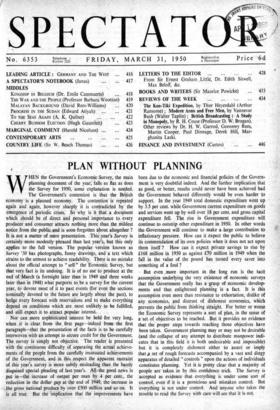PLAN WITHOUT PLANNING
WHEN the Government's Economic Survey, the main planning document of the year, falls as flat as does the Survey for 1950, some explanation is needed. The Government's contention is that the British economy is a planned economy. The contention is repeated again and again, however sharply it is contradicted by the emergence of periodic crises. So why is it that a docament which should be of direct and personal importance to every producer and consumer attracts nothing more than the mildest notice from the public and is soon forgotten about altogether ? It is not a matter of mere presentation. This year's Survey is certainly more modestly phrased than last year's, but this only applies to the full version. The popular version known as Survey '50 has photographs, funny drawings, and a text which strains to the utmost to achieve readability. There is no mistake about the official attempt to " sell " the Economic Survey, but that very fact is its undoing. It is of no use to produce at the end of March (a fortnight later than in 1949 and three weeks later than in 1948) what purports to be a survey for the current year. to devote most of it to past events (for even the sections nominally devoted to the future are largely about the past), to hedge every forecast with reservations and to make everything depend on conditions which are most unlikely to be fulfilled, and still expect it to attract popular interest.
Nor can more sophisticated interest be held for very long, when it is clear from the first page—indeed from the first paragraph—that the presentation of the facts is to be carefully interwoven with an attempt to secure credit for the Government. The survey is simply not objective. The reader is presented with the continuous difficulty of separating the actual achieve- ments of the people from the carefully insinuated achievementi of the Government, and in this respect the apparent restraint of this year's survey is more subtly misleading than the barely disguised special pleading of last year's. All the good news is put in—the increase of output per man by 4 per cent., the reduction in the dollar gap at the end of 1949, the increase in the gross national produce by over £500 million and so on. It is all true. But the implication that the improvements have been due to the economic and financial policies of the Govern- ment is very doubtful indeed. And the further implication that as good, or better, results could never have been achieved had the Government behaved differently would be even harder to support. In the year 1949 total domestic expenditure went up by 3.5 per cent. while Government current expenditure on goods and services went up by well over 18 per cent. and gross capital expenditure fell. The rise in Government expenditure will continue to outstrip other expenditure in 1950. In other words the Government will continue to make a large contribution to inflationary pressure. How can it- expect the public to believe its commendation of its own policies when it does not act upon them itself ? How can it expect private savings to rise by £168 million in 1950 as against £70 million in 1949 when the fall in the value of the pound his turned every saver into something of a fool ?
- But even .more important in the long run is the tacit assumption underlying the very existence of economic surveys that the Government really has a -grasp of economic develop- ments and that enlightened planning is a fact. It is this assumption even more than resistance to exhortation, dislike of any economics, and distrust of dishonest economics, which prevents the- public from thinking straight. For better or worse the Economic Survey represents a sort of plan, in the sense of a- set of objectives to be reached. But it provides no evidence that the proper steps towards reaching those objectives have been taken. Government planning may or may not be desirable (and the collapse of any attempt to distribute manpower indi- cates that in this field it is both undesirable and impossible) but it is completely dishonest either to assert or imply that A set of rough- forecasts accompanied by a vast and dingy apparatus of detailed " controls " upon the actions of individuals constitutes planning. Yet it is pretty clear that a majority of people are taken in by this confidence trick. The Survey is accepted as evidence that everything is under some sort of control, even if it is a pernicious and mistaken control. But everything is not under control. And anyone who takes the trouble to read the Survey with care will see that it is not.






































